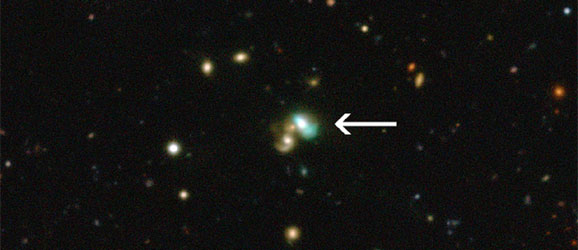New Type of Galaxy Found Because Astronomy Wins
This article is more than 2 years old
 Just when you thought the universe was all out of things to amaze us with, it gets that much more stunning. And you never really thought that anyway, because come on, it’s outer space, and it doesn’t stop, even when the party does.
Just when you thought the universe was all out of things to amaze us with, it gets that much more stunning. And you never really thought that anyway, because come on, it’s outer space, and it doesn’t stop, even when the party does.
Mischa Schirmer, Gemini Observatory astronomer at large, was just minding his own business, looking for galaxy clusters as one is prone to do after lunch. Startling, he stumbled across an image of a galaxy, only it was an unusually bright shade of green and didn’t share all the similarities of other galaxy types. Almost as surprising, a complete lack of bureaucracy entered into his application to use the European Space Observatory’s Very Large Telescope, and a few days and some focus honing later, Schirmer had officially discovered himself a galaxy cluster. Read the anti-layman paper here.
They are being called “green bean galaxies,” due to the color and superficial similarity to green pea galaxies. Or for something more bumper sticker worthy, its’ official name is “J224024.1-092748.” J2240 lies in the Aquarius constellation, and its light took 3.7 billion years to reach us. The bright green color, one of the brightest ever, comes from ionized oxygen, and covers the entire region, unlike normal galaxies where only the center shines the brightest, relevant to the size of the black hole in its center. The astronomers believe the glow must be an echo from the black hole’s more active days. That’s more reverb than Pink Floyd’s entire catalog. Or maybe it’s less. Space-time within music references isn’t my strong suit.
How rare is J2240? After a billion other galaxies were looked over, only 16 other galaxies with similar properties were found. If you take a cube that’s 1.3 billion light years across, you’d only find one green bean in the bunch. Probably in the haystack quadrant.
Schirmer is now able to say those words about himself that few can echo themselves. “Discovering something genuinely new is an astronomer’s dream come true, a once-in-a-lifetime event. It’s very inspiring!” Inspiring indeed, Mr. Schirmer.












